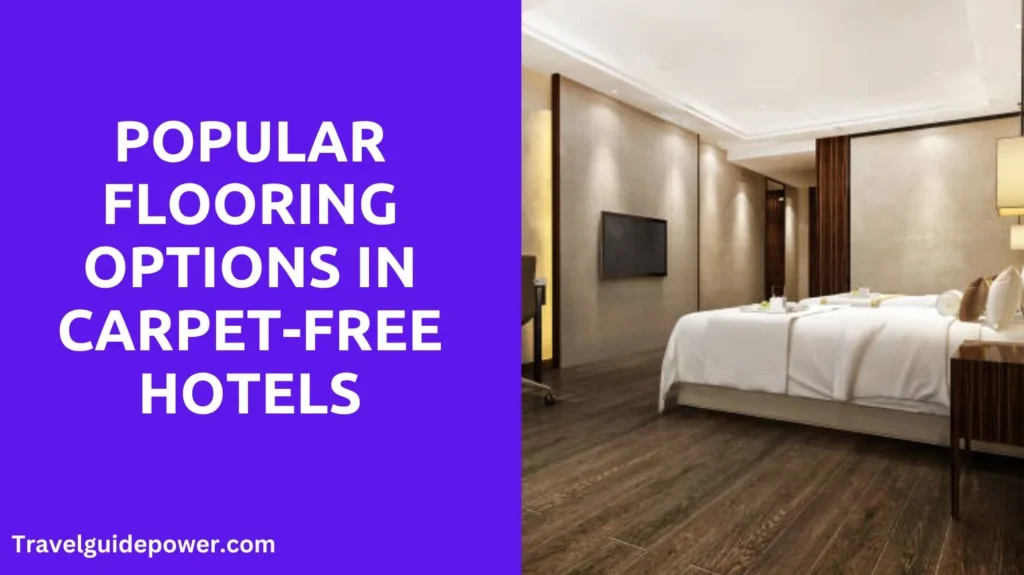How to Find Hotels Without Carpets? (Guide) of 2024
Hotels are constantly evolving to meet the changing demands and preferences of modern travelers. One notable trend in the hospitality industry is the shift towards hotels without carpets.
This article explores the reasons behind this trend, the benefits it offers, popular flooring alternatives, design considerations, maintenance practices, guest experience, and future trends.

Introduction to Hotels Without Carpet
In recent years, hotels have been moving away from traditional carpeted floors in favor of more practical and hygienic options.
This shift is driven by various factors, including concerns about cleanliness, allergies, and sustainability.
Hotel’s without carpets are becoming increasingly popular due to their numerous advantages over carpeted establishments.
Benefits of Without Carpet Hotels
Here are the Benefits of Without Carpet Hotels:
Hygiene and Cleanliness
Carpet-free hotels promote a cleaner and more hygienic environment. Carpets can trap dust, allergens, and bacteria, leading to potential health risks for guests and staff.
By opting for hard flooring surfaces, hotels can significantly reduce the accumulation of dirt and contaminants, ensuring a safer and healthier space for everyone.
Allergy Reduction
For guests with allergies or respiratory issues, carpet-free hotels provide a welcome relief.
Carpets can harbor allergens such as dust mites, pollen, and pet dander, exacerbating allergy symptoms.
Hard flooring options are easier to clean and maintain, minimizing allergen exposure and creating a more comfortable stay for sensitive individuals.
Environmental Sustainability
Many hotels are embracing eco-friendly practices, and choosing flooring materials that are sustainable and environmentally responsible is part of this commitment.
By opting for materials like hardwood, laminate, or cork, hotels can reduce their environmental footprint while still maintaining a stylish and inviting atmosphere.
Popular Flooring Options in Carpet-Free Hotels

- Hardwood Floors
- Laminate Flooring
- Luxury Vinyl Tile (LVT)
- Cork Flooring
Each of these options offers unique benefits in terms of durability, aesthetics, and maintenance requirements, allowing hotels to customize their flooring choices based on their specific needs and preferences.
Design and Aesthetics in Carpet-Free Hotels
The absence of carpets allows hotels to explore creative design possibilities and enhance the overall aesthetic appeal of their spaces.
From modern and sleek hardwood floors to versatile and elegant laminate or LVT options, hotels can create unique atmospheres that align with their brand identity and guest expectations.
Maintenance and Cleaning Practices
Maintaining clean and well-maintained floors is essential for any hotel. Carpet-free establishments benefit from easier cleaning procedures, reduced maintenance costs, and faster turnaround times between guest stays.
Regular vacuuming, mopping, and occasional refinishing ensure that the flooring remains in top condition, enhancing the overall guest experience.
Guest Experience and Comfort
While some may associate carpet with comfort, modern flooring options offer comparable warmth and comfort without the drawbacks of carpeted surfaces.
Area rugs, padded underlays, and thoughtful room layouts can enhance comfort levels for guests while maintaining the benefits of clean and hygienic floors.
Eco-Friendly Practices in Carpet-Free Hotels
The hospitality industry is increasingly focused on sustainability, and carpet-free hotels align with this commitment by choosing environmentally friendly flooring materials.
Renewable resources like cork or sustainable hardwood options contribute to a greener and more responsible approach to hotel design and operations.
Challenges and Considerations
Transitioning to a carpet-free environment is not without challenges. Hotels must consider factors such as acoustics, slip resistance, thermal insulation, and cost implications when selecting flooring materials.
However, with careful planning and informed decisions, these challenges can be effectively addressed to create a seamless and inviting guest experience.
Future Trends in Hotel Flooring
The future of hotel flooring is marked by innovation, sustainability, and guest-centric design.
Advancements in technology, such as smart flooring solutions and eco-friendly materials, will continue to shape the industry and elevate the standards of comfort, hygiene, and aesthetics in hotels worldwide.
People also ask
Why do hotels still have carpets?
Hotels continue to have carpets for several reasons, including their sound-absorbing properties, perceived luxury, and comfort,
cost-effectiveness compared to hard flooring alternatives, and the ability to hide stains and wear.
However, some hotels are transitioning to carpet-free options due to concerns about cleanliness,
allergies, and sustainability, opting for easier-to-maintain flooring materials such as hardwood, laminate, or tile.
What is the best floor to stay on in a hotel?
The best floor to stay on in a hotel depends on personal preferences and priorities.
Generally, lower floors are convenient for easy access to amenities and quick exits during emergencies,
while higher floors offer better views and reduced noise from street-level activities.
However, factors such as noise levels, elevator accessibility, and specific room preferences can vary,
so it’s essential to consider individual needs when choosing a hotel floor.
Do hotels have rooms on the ground floor?
Yes, many hotels have rooms on the ground floor, especially in larger properties or those with multiple buildings.
Ground-floor rooms are often convenient for guests with mobility issues or those who prefer easy access to the hotel’s facilities without using stairs or elevators.
However, availability may vary depending on the hotel’s layout and design.
Why number 13 is not used in hotels?
The number 13 is often considered unlucky or associated with superstitions in various cultures,
leading some hotels to avoid using it for floors or rooms to cater to guests’ preferences and beliefs.
This practice is known as “triskaidekaphobia,” the fear of the number 13, and is not universally observed but can be found in certain hotels.
Conclusion
In conclusion, without carpet hotels represent a forward-thinking approach to hospitality, prioritizing cleanliness, comfort, and sustainability.
By embracing alternative flooring options and adopting best practices in design, maintenance, and guest experience, carpet-free hotels can provide a superior stay experience while meeting the evolving needs of today’s discerning travelers.

I am James, a passionate traveler with a knack for uncovering hidden gems and sharing valuable insights, TravelGuidePower.com is your go-to destination for comprehensive travel guides and honest hotel reviews. With years of globetrotting experience under our belts, we understand the thrill of exploration and the importance of reliable information when planning your next escapade.





